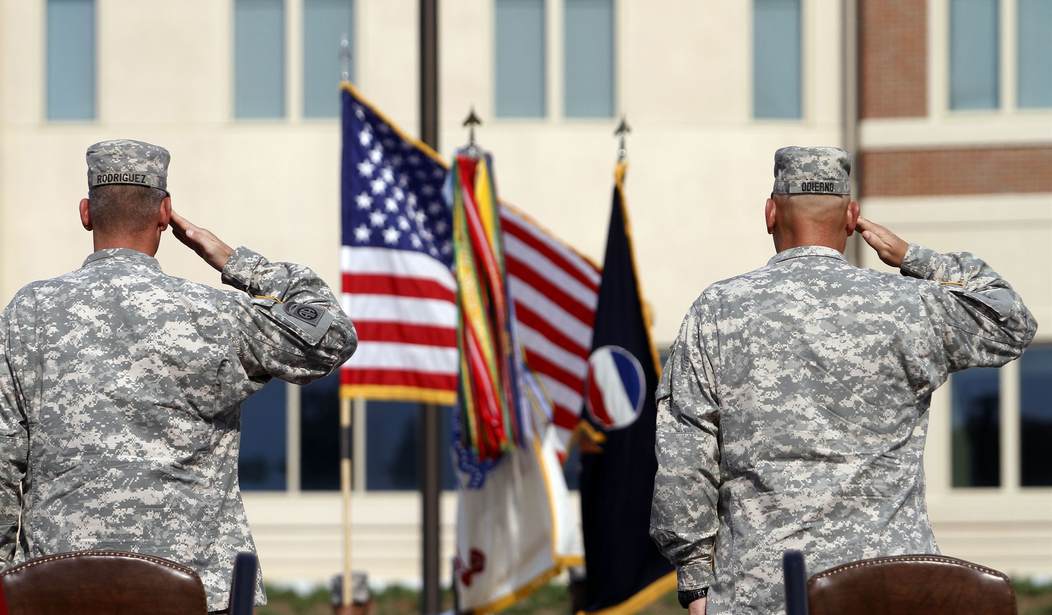Defense Secretary Pete Hegseth fired off a new salvo in the culture war on Monday when he changed the name of Fort Liberty back to Fort Bragg. That’s all to the good, as the left has been doing its best to make Americans ashamed of their own history and heritage so that they will value them less when they’re torn away altogether, and never dream of standing up to defend them. Hegseth has, however, not simply undone the June 2023 change of the military installation’s name from Fort Bragg to Fort Liberty. He has changed the identity of the Bragg who is being honored, a deft move that takes the wind out of the sails of the original case for changing the name to Fort Liberty.
The Washington Times reported Tuesday that Fort Bragg “now honors Army Pfc. Roland L. Bragg, who served in Europe with the 17th Airborne Division during World War II. Pfc. Bragg was awarded the Silver Star and Purple Heart for wounds sustained during the Battle of the Bulge.” Hegseth explained: “During these hellish conditions and amidst ferocious fighting, Pfc. Bragg saved a fellow soldier’s life by commandeering an enemy ambulance and driving it 20 miles to transport a fellow wounded warrior to an Allied hospital in Belgium.”
Neatly done. Roland Bragg was no racist slaveowner. And it is ungracious to take a victory and speculate on how it could have been an even greater victory, but in this case, there is an important issue in play.
Fort Bragg was originally named for Braxton Bragg, an American artillery commander who became a not particularly accomplished Confederate general. Bragg was from North Carolina and was an artilleryman. Fort Bragg was originally founded in 1918 as a site for artillery training, so that was that. Around that time, Civil War veterans were in their seventies or older, and Americans of all regions were keenly aware of the sacrifices they had made as well as anxious to ensure a national unity strong enough to ensure that such a bloody conflict could never happen again.
It was in pursuit of that unity that Fort Bragg and other installations were named. It was an embodiment of Lincoln’s counsel of “malice toward none and charity to all.” Calling a military base Fort Bragg and setting up a statue of Robert E. Lee somewhere was not an endorsement of the Confederacy, of slavery, or even of racism. These were attempts to demonstrate enough generosity of spirit as to grant the possibility that there could have been good and noble men who gave themselves in service of a cause that was not in every area good or noble.
This was a profoundly Christian idea, rooted in the Christian doctrine of the ancestral or original sin, which is the only Christian doctrine, as G. K. Chesterton observed, that admitted of empirical verification. No one is wholly good; no one is entirely wicked. In the same way, no cause is pure and perfect, and while some causes, such as National Socialism or Communism, are wholly evil or something quite close to it, most of them exist where we all do, in a moral gray area full of difficult choices. To 21st-century people, nothing could be clearer than the fact that slavery is evil; to many in the 19th century and before, that was not at all clear. But before we become too self-satisfied, we should remember that 19th-century people took it as axiomatic that there are two sexes, while many in the 21st are lost in fantasy and delusion on that issue.
Hegseth thus could have done the nation and the world a great service by renaming the place Fort Bragg and unapologetically stating:
Yes, Fort Bragg is named for Braxton Bragg, and we are making no apologies about that. The left claims that to name this military installation after such a man is to give a tacit endorsement of insurrection, slavery, and racism. This is arrant nonsense, and we refuse to be intimidated by it.
Fort Bragg was named long after the Civil War by people who were trying to strengthen the unity of our nation. We have also endeavored to strengthen that national unity by establishing Dr. Martin Luther King’s birthday as a national holiday and honoring other black Americans in various ways, and we will continue to do so. What we will not do is give in to those who wish to make us ashamed of our history so that they can direct our future in ways that will be profoundly damaging to our nation and its people.
And so Braxton Bragg is back. We don’t endorse his Confederacy any more than we did when the fort was founded. But we will remember who we are, and where we have been, and take pride in those who brought us to where we are now.
Maybe next time, eh, Mr. Secretary?










